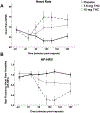Acute effects of oral delta-9-tetrahydrocannabinol (THC) on autonomic cardiac activity and their relation to subjective and anxiogenic effects
- PMID: 34665890
- PMCID: PMC8724445
- DOI: 10.1111/psyp.13955
Acute effects of oral delta-9-tetrahydrocannabinol (THC) on autonomic cardiac activity and their relation to subjective and anxiogenic effects
Abstract
Cannabis is the most commonly used psychotropic drug in the United States, after alcohol. Despite its apparent sedative and calming effects, cannabis and its main psychoactive constituent, ∆9 -tetrahydrocannabinol (THC) can produce serious adverse effects including tachycardia and anxiety. These effects can be especially pronounced in women, who remain underrepresented in clinical cannabinoid research. The present study is one of the first to characterize the effects of single doses of oral THC on autonomic nervous system function in healthy adult women. Occasional female cannabis users participated in three laboratory sessions in which they received oral THC (7.5 and 15 mg) and placebo. Autonomic measures included heart rate (HR), blood pressure (BP), pre-ejection period (PEP) a measure of cardiac sympathetic functioning, and high frequency heart rate variability (HF-HRV) a measure of parasympathetic cardiac control. Autonomic responses were examined in relation to subjective drug effects. THC dose-dependently increased HR, decreased HF-HRV, and increased ratings of feeling a drug effect, cannabis-like intoxication, and anxiety. Although the drug did not significantly affect BP or PEP, HR was negatively related to both PEP and HF-HRV. HF-HRV, the measure of parasympathetic activity, was significantly negatively related to subjective measures of cannabis intoxication (but not anxiety) at the 15 mg dose only. PEP was not significantly related to any subjective measure. These results extend our knowledge of the autonomic effects of THC in relation to subjective drug experience. This and future studies will help us to understand risk factors related to cannabis use.
Keywords: Cannabis; autonomic; delta-9-tetrahydrocannabinol; heart rate; heart rate variability; impedance cardiography.
© 2021 Society for Psychophysiological Research.
Conflict of interest statement
Conflict of Interest Statement
The authors declare that there are no conflicts of interest.
Figures





References
-
- American Psychiatric Association (APA). (2013). Substance-related and addictive disorders. In Diagnostic and statistical manual of mental disorders (5th ed.). 10.1176/appi.books.9780890425596.dsm16 - DOI
Publication types
MeSH terms
Substances
Grants and funding
LinkOut - more resources
Full Text Sources
Medical
Research Materials
Miscellaneous

